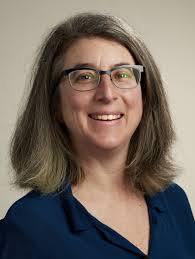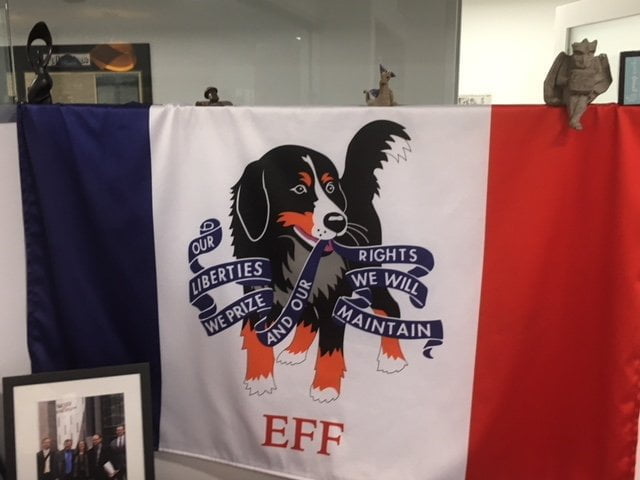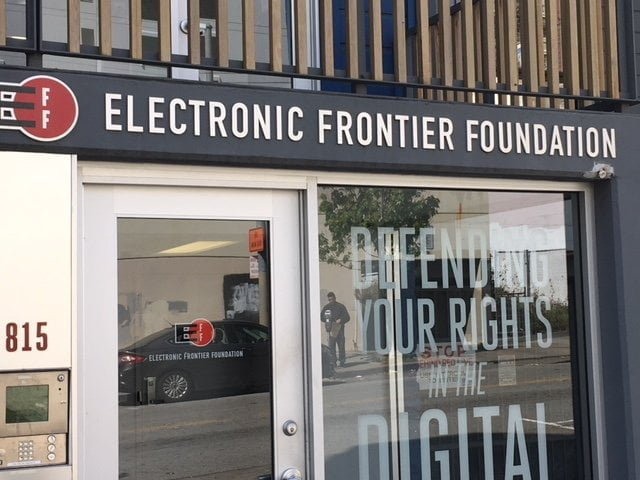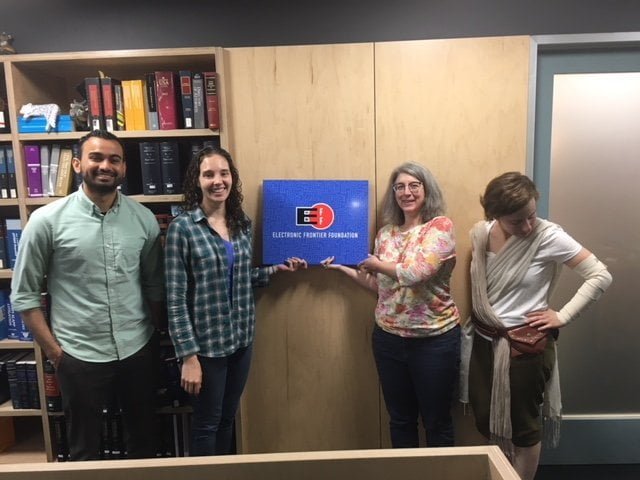Better Than Most is a regular feature of The Business of Giving, examining the best places to work among social good businesses and nonprofit organizations.
Denver: Tonight we will venture out to San Francisco, and to the offices of the Electronic Frontier Foundation, EFF. They are the leading non-profit organization defending civil liberties in the digital world. We’ll begin with their Executive Director, Cindy Cohn and then hear from some other members of the staff.

Cindy Cohn
Cindy: I would say that the core values of our organization are to try to make sure that we are building a technological future that we all want to live in, and specifically around issues around justice and freedom and connectivity and innovation. We try that same idea inside the organization, that are we are co-creating the culture at EFF and the organization should be helping bringing about inside the organization the same thing that we’re looking for outside the organization. So we emphasize a lot making sure that people have a voice; have the freedom to be working on the things that they really care about.
Erica: I notice this personally on a project that I now work on called SMS – the secure messaging scorecard. The way I got started on this project is I was actually just making a cup of tea and I walked by a conference room and I hear some words coming out that are related to things I’m interested in like “encryption” and “messaging.” And I go, “I’ve done some work on that in the past,” kind of stick my head in, people just wave me in and are like, “Come. Sit down. You look like you’re interested. Come sit down and work on this project with us.” And that’s how I got started on that.
Gennie: Yeah, my co-worker went to find my apartment for me.” It’s walking distance away, but it’s like a huge thing he went over on a lunch break. Even then, I felt like I was already part of the family. And it set the tone that the people I was reporting to are really looking out for me in a holistic way, knowing perhaps that if I live in a sinkhole, I’m not going to get a very good work done when I come to the office. So that was something that really struck me when I started working here.
Cindy: We have a student loan repayment assistance program. We have rental assistance. We have a pretty innovative program where we help people with down payments on houses. In the San Francisco area, it’s really pretty hard to get the down payment necessary given the way our housing prices work. So EFF actually will loan a no-interest loan up to about $150,000 to our employees. We have a special fund that’s set aside to let them buy housing in the bay area. And this is specifically aimed at people who are kind of midcareer and really wanting to start a family, wanting to have the benefit of feeling safe in their homes in the San Francisco area.

Amul: So it’s really cool that this thing started off as me just saying like, “God. I’m angry about this. What can we do?” And the next thing I know, I’m like one of the go-to people for something like this that gets introduced. So to me, that’s very cool and that’s how my second title of Analyst came about because I was like, “I want to do all this other cool things that we’re doing,” and the organization leaders were like, “Yeah, you should.” And cool, here’s another title.
Erica: You can feel it every day that you’re working here, every project that you’re working on and every time that you talk to a co-worker that the work that you’re doing is having a net positive impact on the world. Maybe neutral when we can’t get our policies through, but we’re really striving for that. It’s never the question, “Oh, is what I’m doing actually changing the world? Why am I doing all this work?” No. If it weren’t going to be trying to fight for civil liberties, if it weren’t trying to defend democracy, we wouldn’t be doing it. We would say, “Actually, no. Let’s kill that project and do something more important.” People don’t go around saying it to each other because you just know that everybody else feels the same way. Being on the same wavelength as everyone else working with people who all couldn’t do anything other than helping the world is just an amazing feeling.
Gennie: And also when I was doing interviews, what Cindy said earlier about building a career here for people, like this isn’t a job you get for two or three years after school, and then you go get your real job, she told me that during my first or second interview. And that also set the tone for the expectation that this is a place where I’ll be able to build a career, where I’ll be able to find new opportunities where there will be a path to advancement and learning and in so many ways, leveling up my own professional proficiencies. So hearing that as part of a process where I’m being grilled for a representative of the organization to also showing me what they were ready to offer and what I could expect was very striking.
Cindy: And for people in the mid- and high ranges of a lot of nonprofits, I do think that one of the things that really causes burnout is this part where you’re always worried about where the money comes from and we try to make sure structurally that that just isn’t in the way of our staffers. Now, many staffers do get involved in the pitches and things like that especially major donors or foundations. They want to talk to the people who are doing the work. But that’s different than having the responsibility to actually raise the money and trying to keep that [bind] really clear is one of the things that we’ve always done structurally and I think it helps create that environment.

Amul: Along those lines, I feel more and more—maybe empowered is not the right word, but I feel OK about doing these kinds of ridiculous things because I know that people at EFF would be happy to go along with it or at least humor me or if they feel weird about it, they haven’t told me about it yet, which I think is another good thing. I think that my co-workers are definitely one of the best parts of working at EFF.
Gennie: Yeah. I want to work here forever.” Because I expect to be in the mental and physical state to keep working this hard and making this kind of change. I think something that is so common in nonprofit work are people—it’s more than a paycheck. This is my heart. This is something I believe in in my core. I’m willing to work really long hours. I’m willing to work late nights. But I need somebody, and I have people at EFF who are fighting the fight against burnout with me and will be able to point out, if they see me working late, they’re like, “Are you going home soon?” Or be able to very strictly say, “Don’t get on the listserv over Christmas break.” I think that watching out for that, watching out for the fact that we have a long-term fight that we’re fighting. I feel very confidently that EFF needs me not just for a couple of years but for the whole fight.
Cindy: We certainly have lots of geeky fun at EFF. We have a tradition for our holiday party. Usually, there’s a big blockbuster, a Sci-Fi movie that comes out. It started with some of the Star Wars movies, also the Star Trek, and we will rent out a movie theater on opening day and have everybody go for the big holiday blockbuster. And that’s been a tradition for over a decade at EFF. Fridays, people often dress as cats. They call it Catual Friday. There was a day where a bunch of people showed up in onesies. Anyway, let your freak flag fly at EFF. We come from the version of the internet where it was a place where people who didn’t fit in very well could find other people who didn’t fit in. So celebrating the places where we don’t fit in is actually a really core part of the culture. You don’t have to be a geek at work at EFF. In fact, lots of people here aren’t and they’re geeky in other ways. But usually within about a month or two of somebody starting, we start to see them open up and show the part of themselves that doesn’t fit in very well. And it will almost always be celebrated.
Erica: And as I’m walking to the office this morning, I’m just walking through the streets of San Francisco dressed completely ridiculously. I’ve got like scarves crisscrossed over my chest. It’s really weird. I’m wearing arm bandages. Somebody asked me if I was OK. But I was just like, “Oh my god, I can’t wait to get inside the office where nobody will judge me anymore.” Knowing that “Oh god, I need to get inside my workplace so that people will not think I’m weird anymore,” that was just like wow. That’s so EFF
Cindy: I firmly believe that that comes by letting people grow and letting people learn how to do it, but it also means sometimes having hard conversations with people about going to where they’re using their skills to the best of their ability rather than something that they may be passionate about but they’re not bringing the excellence. Those are hard conversations but I think that helps everybody feel like they’re supported and that they’re not going to have to spend their time making up for somebody who’s not being able to do their best. That’s how you keep people excited and engaged is they need to feel like they’re among peers and that they’re all in it together and that everybody is smart and excellent. One of the things that I hear in our feedback all the time is, to the point of almost impostor syndrome, the sense that when you come to EFF, you’re coming to work with the best. And that’s my job is to make sure that that happens.
Denver: I want to thank those who participated in this segment, Gennie Gebhart, Erica Portnoy, Amul Kalia, and Cindy Cohn. To hear this again, read the transcript or see pictures of the participants and the Electronic Frontier Foundation offices, simply come to www.denver-frederick.com

